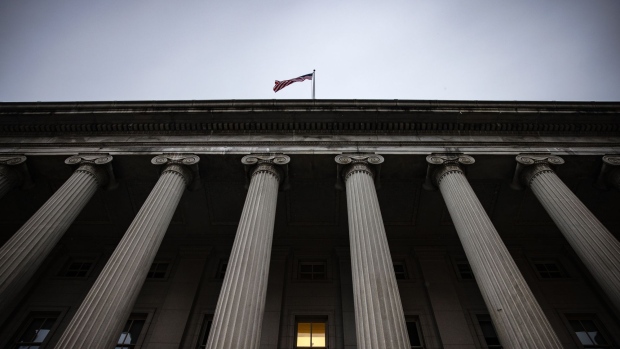Jul 22, 2022
US Treasury Gives Blessing for Swaps Auction on Russian Bonds
, Bloomberg News

(Bloomberg) -- The US Treasury will authorize an auction in credit default swaps sold on Russian bonds after banning trading in Russian securities on the secondary market.
The department’s Office of Foreign Assets Control, or OFAC, which oversees US sanctions policy, has issued two general licenses allowing the auction and associated wind-down activities to proceed, after a group of market participants petitioned the agency.
The move is designed to help US and other global investors cleanly exit their exposures to Russia, according to a Treasury spokesperson.
Neither license authorizes the injection of capital into Russia or approves any transactions involving people or entities that have been sanctioned. A ban on new investment will continue to prevent funds from flowing into Russia and solidify its status as a global financial pariah, the person said.
The decision paves the way for the settlement of a potentially lucrative insurance wager on Russian bonds.
At stake is a possible payment of $1.5 billion after the panel -- the Credit Derivatives Determinations Committee, or CDDC -- ruled at the start of June that Russia had triggered a so-called failure-to-pay event after it missed paying interest of $1.9 million on a sovereign bond.
Sanctions guidance published in early June by OFAC banned US investors from purchasing Russian debt on the secondary market, a move that complicated any payout on the credit default swaps.
Settlement normally happens through an auction process, and that relies on a functioning secondary market for the defaulted bonds in question. But in this case, the secondary market was subject to a US ban.
Russia Swaps Payout in Turmoil as Sanctions Tear Up Playbook
The CDDC had petitioned the US Treasury to allow temporary trading in Russian assets, in order to allow the outstanding insurance swaps to be settled, as Bloomberg News reported at the time.
As it awaited a response from the US Treasury, the CDDC met several times over the last few weeks to assess options for settlement. Yet, the panel didn’t come to a final conclusion, as no developments came from OFAC, according to statements published on the panel’s website.
While the failure-to-pay event in June wasn’t large enough to trigger a broader default on Russian debt, a deadline to remedy coupons missed in May expired in late June, creating what the bond documents call an “event of default.”
Fall-backs to an auction, as described in the CDDC’s playbook, would have included physical or cash settlement on a bilateral basis. But the sanctions could affect those routes too, or present their own issues, potentially forcing the panel come up with a solution outside its typical processes.
©2022 Bloomberg L.P.





